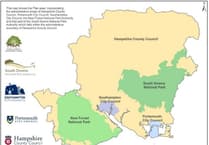Firefighters in Hampshire and the Isle of Wight are getting to fires quicker than they did a year ago, new figures show.
The Fire Brigades Union said the fire service is "in crisis after years of austerity and fragmentation", with fewer firefighters and cuts to key resources.
Home Office data shows the average response time of Hampshire and the Isle of Wight Fire and Rescue Service for primary fires was nine minutes and 52 seconds in the year to March.
This was an improvement on the year before, when it stood at 10 minutes and two seconds.
But it was slower than 10 years ago, when the average response time was eight minutes and 30 seconds.
Primary fires are classed as more serious fires that could cause harm to people or damage to property.
Nationally the average response time for these fires fell from a record high nine minutes and 13 seconds to nine minutes and three seconds.
A decade ago, it stood at eight minutes and 16 seconds.
Matt Wrack, Fire Brigades Union general secretary said: "While we face the flooding, wildfires and extreme weather of the climate emergency, we have lost one in five firefighters to cuts.
"Fewer resources mean that fire engines take far longer to arrive at a fire than in the 1990s, and fire services' capacity varies wildly by region. Last year's response times, the slowest in recent records, should have been a wake-up call.
"The Government must deliver on promises to end the fire cover postcode lottery through a statutory advisory body, and provide the urgent investment needed to protect homes and lives."
The data also reveals the total number of incidents attended by Hampshire and the Isle of Wight Fire and Rescue Service has decreased.
In the year to March there were 17,956 incidents attended by firefighters in Hampshire and the Isle of Wight – down from 17,985 the year before.
Of these, 5,051 were non-fire incidents, such as traffic collisions, medical emergencies or flooding-related callouts.
The number of incidents attended across England fell by 4% last year, while 251 fire-related fatalities were recorded, a 5% decrease on the previous year.
In Hampshire and the Isle of Wight there were three fatalities, fewer than the year before when there were four.
A Home Office spokesperson said: "Throughout the country, our firefighters operate in challenging and high-risk environments, constantly going above and beyond the call of duty to protect our communities.
"Our Fire and Rescue Services are receiving around £2.9 billion in this financial year, and we will continue to work closely with stakeholders across the sector to ensure all services have the resources they need to protect communities at the highest standard."



